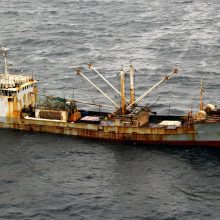Source: Hakai Magazine
Author: Marcus Woo
Recent research suggests fisheries closures would have minimal effect on global food security, but some scientists think the case isn’t so clear cut.
Far offshore are the high seas—waters beyond any country’s jurisdiction and the focus of a contentious debate. The high seas, which cover nearly two-thirds of the ocean’s surface, have recently seen an increase in fishing and other activities, such as deep-sea mining. To protect the biodiversity of this vast environment, delegates attending a meeting currently underway in New York are negotiating for a new international treaty, an addition to the United Nations Convention on the Law of the Sea.
At this, the first in a series of meetings, some activists and scientists are urging the United Nations to discuss regulating, and perhaps even banning,* fishing and other activities on the high seas.
Currently, high-seas fishing is mainly managed by regional organizations, such as the Western and Central Pacific Fisheries Commission. But some scientists and conservationists say a global agreement is needed to protect this critical habitat from destructive activities. Deep-sea fishing often involves bottom trawling, which can kill life on the seafloor, threatening, for example, deep-water coral ecosystems. By-catch is a problem, too, and the lack of adequate regulation and enforcement also threatens vulnerable species. While stocks of some target fish such as tuna remain mostly healthy, some are overfished.
But some scientists and fisheries experts are concerned that restricting high-seas fishing will strain an already stretched global food supply and are questioning any fisheries restrictions.
A new study, however, suggests that prohibiting fishing wouldn’t affect the world’s seafood supply much at all.
Continue reading here.

